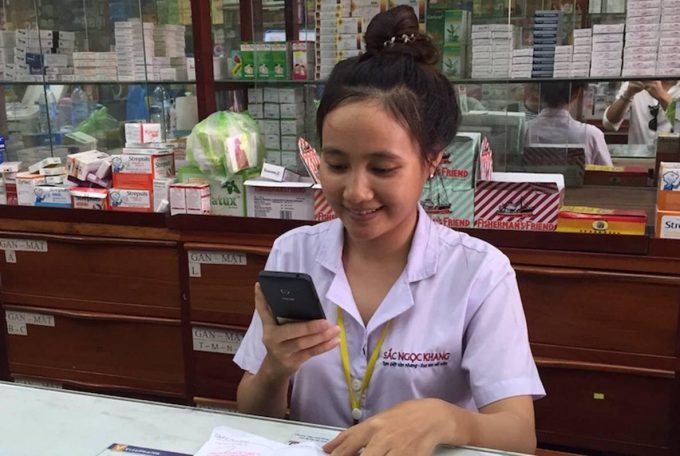Health startups are pulling in money in Southeast Asia. A week after wellness-focused insurance brokerage CXA drew $25 million from investors, fellow Singapore-based startup mClinica has announced a $6.3 million Series A raise.
mClinica was founded in 2012 and its mission is to provide healthcare data in Southeast Asia, much like Nielsen and other traditional analyst houses, through an alliance with pharmaceutical stores on the ground.
Founder and CEO Farouk Meralli explained in an interview that the region’s currently lacks data because it is dominated by small ‘mom and pop’ style stores. That, he said, leaves pharma companies wanting to know more about their business, supply chain and the competitive landscape, while governments and NGOs are deprived of important data that can shape policy or detect outbreaks.
“In U.S. or UK, the consumer healthcare space is dominated by chains like Walgreens or Boots, but here it is thousands of independent pharmacies, it’s crazy,” Meralli told TechCrunch, explaining that this severely inhibits market understanding.
Mobile devices and the internet present an opportunity to change things. Meralli is aiming to make a difference by helping track how medicines are being used in Southeast Asia with more clarity than ever. Today, the mClinica service is present in three countries — the Philippines, Indonesia and Vietnam — where it offers a platform for local pharmacies to help them make sense of their business. In that respect, it feels a lot like blend between Practo, the Indian startup that connects doctors with patients and is backed by Tencent, and shopping loyalty service Snapcart in Indonesia.
First and foremost, mClinica tracks what medicines are being prescribed, dispensed and bought in small stories, which Meralli said account for 97 percent of all pharmacies in Indonesia, for example. The company’s app is for pharmacy stores, not consumers, and it provides them with a loyalty/discount program for customers, news from the industry and other tools to manage their business.
There’s no consumer app, customers simply provide their mobile number once (to register) and again at the counter for future purchases to claim loyalty points and discounts. Details are collected by the pharmacy and the system means that it doesn’t matter which store a customer shops at, so long as it is on the mClinica platform, they get their discount and the data is captured, too. (Meralli said data is “desensitized” appropriately to protect individuals privacy.)
By providing incentives and an easy way to authenticate customers, mClinica has a pretty efficient data capture system that’s built for a region where hundreds of millions remain offline and unbanked, despite smartphone sales growing on at a higher-than-global rate.
The data is then used to compile reports that can be sold to pharma companies wanting to learn the lay of the land in Southeast Asia, or provided to public sector players like governments and NGOs.

A photo of a pharmacist in Vietnam using mClinica taken by mClinica COO Vasil Rusinov
On the business side of things, Meralli is fairly coy with numbers at this point. He didn’t say how many users it has authenticated, instead stating that his firm has a “potential reach” of 70 million patients through the more than 5,000 pharmacies it works with. Scale is the key to accurate and informative data and reports. The company plans to use its new funds to grow its reach using offline methods — advertising and feet on the street sales — alongside digital means such as Facebook to reach pharmacies.
Even at this point, though, some data is better than relative guesswork. That’s very much the sales pitch for expansion. Meralli said he is aiming to expand to cover Malaysia and Thailand before the end of the year, while Cambodia, Laos and Myanmar are also on the radar.
“We can make a massive leap forward [and create] a national infrastructure in just a few months,” he said.
That’s the idea to encourage governments to get on board, plus, he added, mClinica “tends to give a lot of this data for free” to public sector organizations to help shape policy and paint a picture of the here and now of a nation’s health. Many emerging markets right now rely on censor data which can be patchy and up to seven years old in some cases.
“Currently, we lose visibility though the entire supply chain, so we’re going to the last mile and filling in that data gap,” Meralli added.
Initially, the idea was conceived for massive markets like Brazil and India, but the Philippines was selected for an initial pilot following a request from a prospective customer. Meralli said his team is heads-down focused on Southeast Asia right now, but he did concede that there is interest from other parties keen to explore expansion to other parts of the world. He didn’t indicate whether the company would pursue this in 2017.
mClinica certainly has a global feel to the investor side of its business. This new round was led by Unitus Impact in Silicon Valley with participation from London-based Global Innovation Fund, Indonesia’s MDI Ventures and Endeavor. Previous investors 500 Startups, IMJ Investment Partners and Kickstart Ventures — which raised a 2014 seed round for the startup — also took part.
